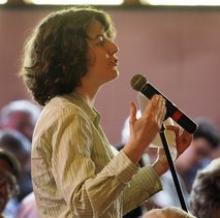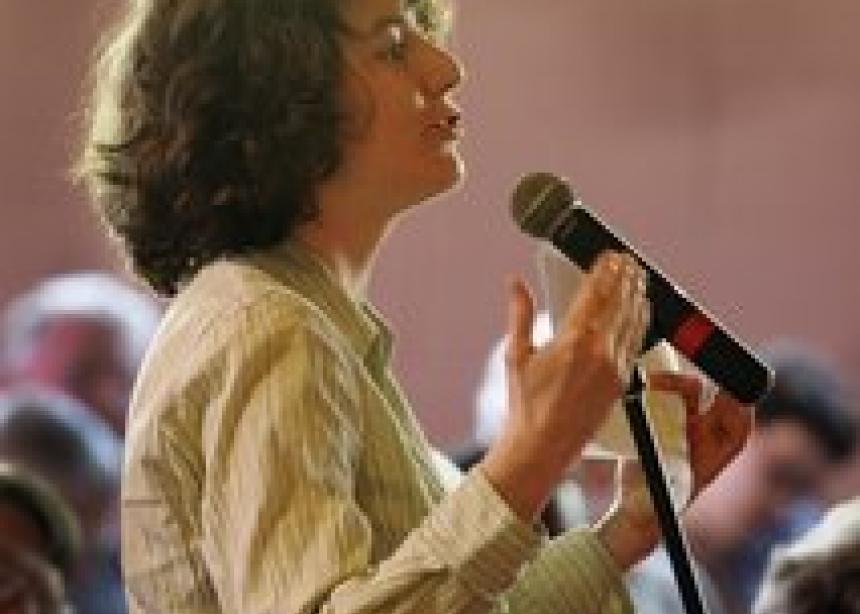Gay and lesbian advocates celebrated a landmark victory on May 10 when the Presbyterian Church (USA) entered the expanding ranks of Christian denominations that allow openly gay, partnered clergy. The winds of change, they said, are at their backs.
"Presbyterians join a growing Protestant movement of Lutherans, Episcopalians and United Church of Christ members who have eliminated official barriers to leadership by lesbian, gay, bisexual and transgender persons," a coalition of pro-gay Presbyterians said in a statement, Religion News Service reports.
The momentum of the gay clergy movement, however, may soon grind to a halt."There is not another denomination I see on the horizon right now that is on the cusp of this," said Robert P. Jones, CEO of Public Religion Research Institute, a nonpartisan research and consulting firm.
Officially, the PCUSA's decades-old barrier will fall in July, after Presbyterians in Minnesota voted to effectively revoke a rule that had barred sexually active gays and lesbians from becoming ministers, elders and deacons. The new policy, which was passed by the church's General Assembly last summer, required approval from a majority of 173 regional presbyteries. Since 1997, three similar amendments had failed at the regional level.
Lisa Larges, a San Francisco lesbian blocked from pursuing ordination for 25 years, called the vote "a new beginning," for her calling and her church. "With this vote, our church is demonstrating that we are choosing to reach out to a new generation," Larges said. But even as gay and lesbian Christians celebrated, some acknowledged that steep challenges lie ahead in other denominations, particularly the country's largest four: the Roman Catholic Church, the Southern Baptist Convention, the United Methodist Church, and the Church of Jesus Christ of Latter-day Saints.
Those four denominations, whose leaders show few signs of accepting gay clergy or relationships, together count nearly 100 million members. By contrast, the four largest denominations that allow gay clergy together count less than 11 million members. The Presbyterian Church (USA), for example, has about 2.1 million members. "I do think there is momentum on this," said the Rev. Rebecca Voelkel, a UCC minister and director of the church component of the National Gay and Lesbian Task Force. "But I don't think it's going to happen with lightening speed, and I don't think it's inevitable." she said.
Gay rights activists in the United Methodist Church, for example, have labored in vain for years to remove a rule that calls homosexuality "incompatible with Christian teaching," and bars the ordination of non-celibate gays and lesbians.
According to a 2008 survey conducted by the Public Religion Research Institute, just 32 percent of Methodist ministers want to allow gay clergy. "The data would not suggest that United Methodist clergy are on the cusp of supporting gay and lesbian ordination," Jones said. Moreover, the UMC, which has about 12 million members worldwide, is growing most rapidly in Africa, where Christians tend to hold conservative views on theology and sexuality, noted Alan Wisdom, vice president of the Institute for Religion and Democracy, a Washington-based conservative think tank.
And while polls show American lay Catholics becoming more accepting of homosexuality, the hierarchy remains staunchly opposed. In fact, the Vatican mounted an investigation aimed at eradicating "homosexual behavior" from U.S. seminaries after the clergy sexual abuse scandal exploded in 2002.
The Mormon church, with about 6 million U.S. members, does not have full-time clergy, but said last year that celibate gay Mormons who are "worthy and qualified in every other way" should be allowed to have "callings," or church assignments. However, the church still says homosexuality "violates the commandments of God, is contrary to the purposes of human sexuality, and deprives people of the blessings that can be found in family life and in the saving ordinances of the gospel."
Jones and other social scientists say young evangelicals are more gay-friendly than previous generations. But the nation's largest evangelical denomination, the 16-million-member Southern Baptist Convention, has dug in its heels. Homosexuality is "prohibited and condemned in both the Old and New Testaments," the SBC said in a 2009 resolution. The resolution, which passed by a wide margin, also calls gay marriage "diametrically opposed to God's word."
--May 12, 2011

Amy Kosari, of Ellswroth, Wis. a representative of a Presbyterian church belonging to the Synod of the Lakes and Prairies in the Twin Cities area, speaks against an amendment to eliminate the celibacy requirement for gay and lesbian clergy at the Peace Presbyterian Church in St. Louis Park, Minn. --AP Photo


Add new comment
Canadian Mennonite invites comments and encourages constructive discussion about our content. Actual full names (first and last) are required. Comments are moderated and may be edited. They will not appear online until approved and will be posted during business hours. Some comments may be reproduced in print.